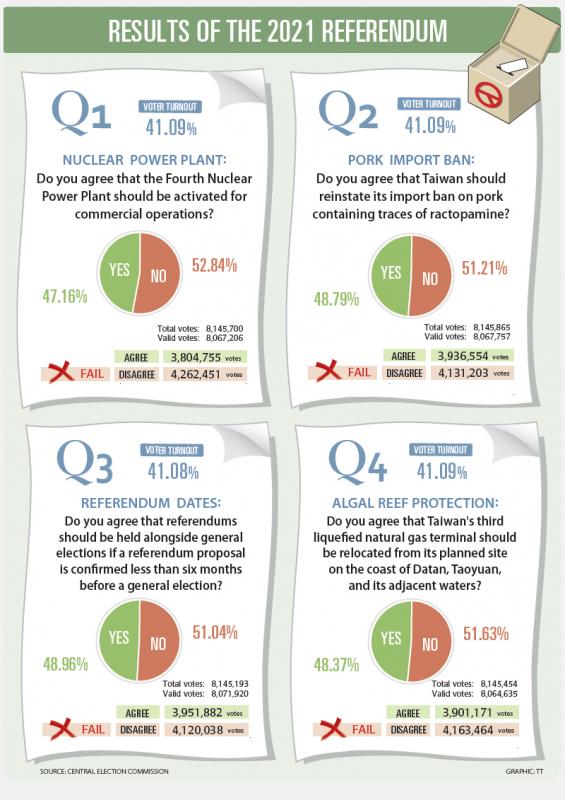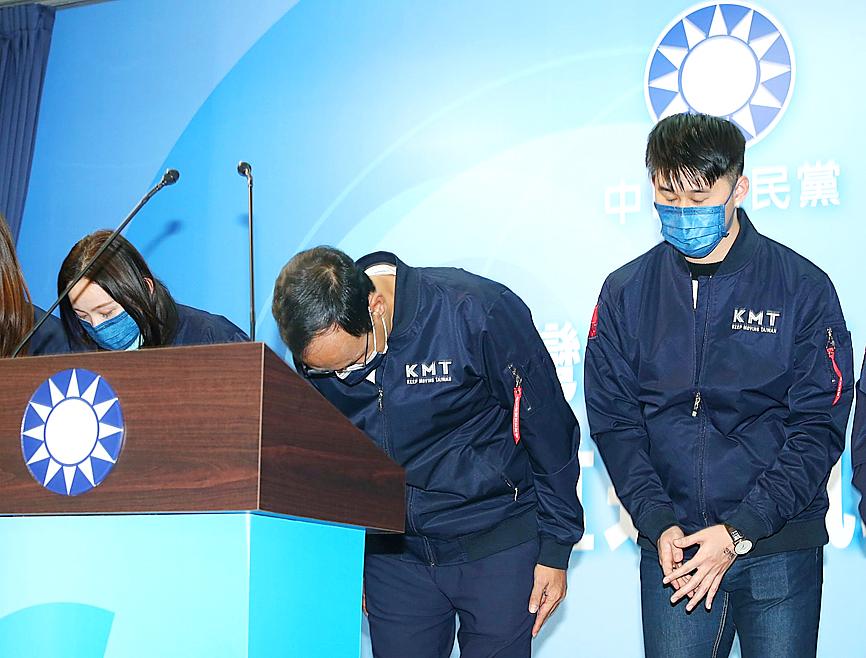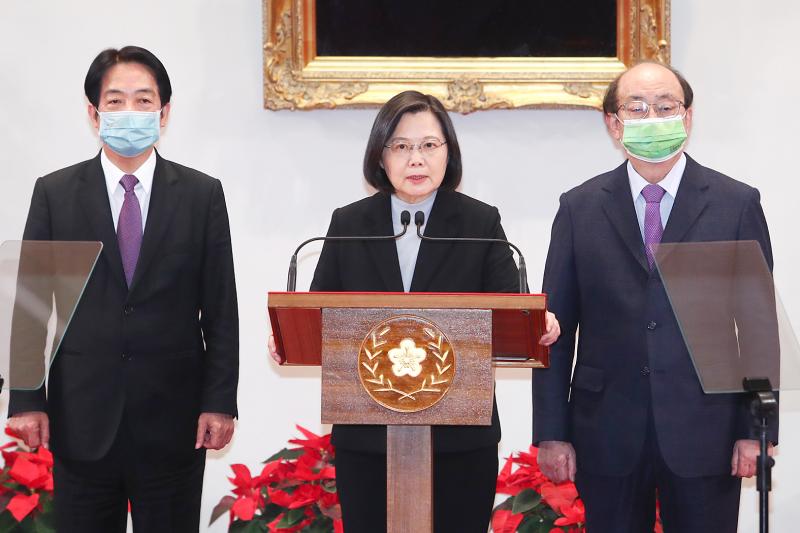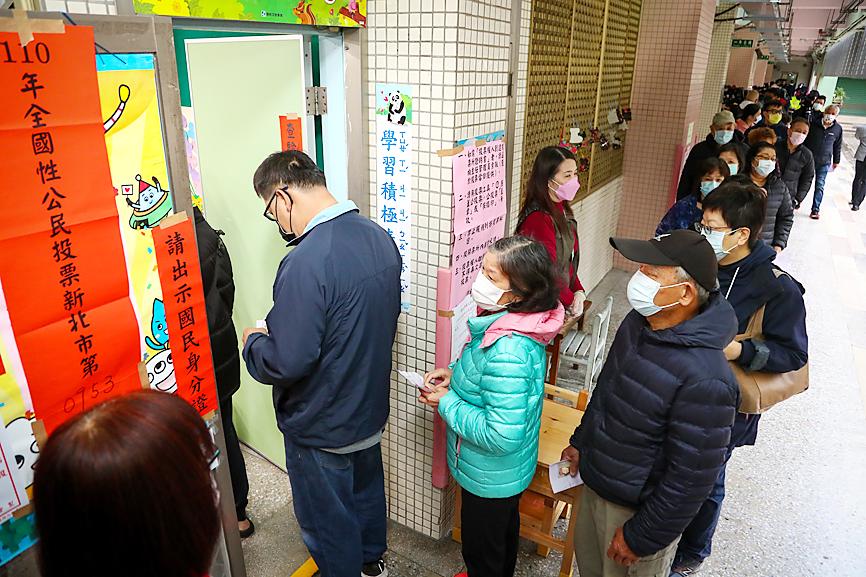Four initiatives challenging the government’s policies on energy, food safety, environmental protection and regulations governing referendums failed to pass yesterday in a national referendum characterized by a relatively low turnout and nearly identical vote margins on all four issues.
Under the Referendum Act (公民投票法), a referendum can only pass if an initiative is supported by at least one-quarter of all eligible voters, and the “yes” votes exceed the “no” votes. For yesterday’s vote, that meant an initiative could only pass if it garnered at least 4,956,367 “yes” votes and there were fewer “no” votes.
Referendum No. 17, proposed by nuclear power advocate Huang Shih-hsiu (黃士修), asked voters: “Do you agree that the Fourth Nuclear Power Plant should be activated for commercial operations?”

The question garnered 4,262,451 votes against and 3,804,755 in favor, with a voter turnout rate of 41.09 percent.
Referendum No. 18 asked voters: "Do you agree to a total ban on the importation of pork and related products containing the beta agonist ractopamine?" It garnered 4,131,203 “no” votes and 3,936,554 “yes” votes, with a voter turnout rate of 41.09 percent.
Spearheaded by Chinese Nationalist Party (KMT) Legislator Lin Wei-chou (林為洲), the initiative was prompted by the government’s move to lift a ban on the importation of pork containing traces of ractopamine, even though Taiwanese hog farmers are banned from using the feed additive.

Photo: CNA
The lifting of the ban, which took effect on Jan. 1, was widely viewed as an effort to satisfy US prerequisites for any negotiations on a bilateral trade deal.
Asked about the vote, an official at the American Institute in Taiwan yesterday said: “We will continue to seek constructive engagement with Taiwan on issues that affect exports of US food and agricultural products.”
Referendum No. 19 asked: “Do you agree that referendums should be held alongside general elections if a referendum proposal is confirmed less than six months before a general election?”

Photo: CNA
The question received 4,120,038 “no” votes and 3,951,882 “yes” votes, with a voter turnout rate of 41.08 percent.
It was initiated by former KMT chairman Johnny Chiang (江啟臣).
Referendum No. 20, initiated by Rescue Datan’s Algal Reefs Alliance convener Pan Chong-cheng (潘忠政), asked: “Do you agree that Taiwan’s third liquefied natural gas [LNG] terminal should be relocated from its planned site on the coast of Datan, Taoyuan, and its adjacent waters?”

Photo: CNA
The question garnered 4,163,464 votes against and 3,901,171 in favor. It had a voter turnout rate of 41.09 percent.
The Democratic Progressive Party (DPP) had urged people to vote against all four questions, while the main opposition KMT supported a “yes” vote for all of them.
In response to the referendum results, President Tsai Ing-wen (蔡英文), who is the DPP chairperson, last night said there were no winners or losers in the referendums and that the issues were questions about the nation’s direction.
The results show Taiwanese support opening up to the world, the nation’s energy transition, a balanced approach to environmental protection and economic development, and rational discourse on public policy, she told a news conference at the Presidential Office.
The initiatives were also expressions of dissent against the government’s agenda, which is normal in a democratic society, she said, adding that policymaking should accommodate for differences in opinion.
Democracy continues to be the strongest form of defense for Taiwan as the government looks to the challenges ahead, she said before thanking the public for casting ballots in the referendums.
Separately, KMT Chairman Eric Chu (朱立倫) expressed the party’s apologies over the outcome of the referendums.
The result is a victory for a new autocratic government in Taiwan that pretends to be a democracy, but is a defeat for civic groups and people who wish to deepen democracy in the nation, Chu told a news conference at KMT headquarters in Taipei.
The turnout reflected the support base on both sides, Chu said, adding that he had not tried hard enough to sway independent voters.
He would take responsibility as party chairman for failing to achieve the party’s goals, he said.
In response to some party members’ demands that the party discipline New Taipei City Mayor Hou You-yi (侯友宜) of the KMT for refusing to reveal his stance on the four initiatives, Chu said he shouldered the majority of the blame.
“The party must find more friends and not enemies,” he said.
The KMT would continue to push to improve democracy in Taiwan, he added.
Meanwhile, the Taiwan People’s Party (TPP) in a statement blamed disinformation and trickery for the result.
Tsai mispresented the initiative on pork imports as a total rejection of US pork, while the relocation of the LNG terminal was distorted into a proposal to halt its construction, the TPP said.
The rejection of the initiatives is a negative turn in the nation’s democratization that indicates “the emergence of a giant green new authoritarian machine,” the party said, referring to the pan-green camp.
That none of the initiatives reached the legal threshold shows that people have punished political parties for sowing division and that the public was unresponsive to fear-mongering, it said.
The results should cause consternation in every political party in the nation, it added.
Inconvenient election mechanisms were another reason for the low turnout and lawmakers should create a law to allow absentee voting, it said.
Additional reporting by Chen Yun, CNA and Reuters

CHAOS: Iranians took to the streets playing celebratory music after reports of Khamenei’s death on Saturday, while mourners also gathered in Tehran yesterday Iranian Supreme Leader Ayatollah Ali Khamenei was killed in a major attack on Iran launched by Israel and the US, throwing the future of the Islamic republic into doubt and raising the risk of regional instability. Iranian state television and the state-run IRNA news agency announced the 86-year-old’s death early yesterday. US President Donald Trump said it gave Iranians their “greatest chance” to “take back” their country. The announcements came after a joint US and Israeli aerial bombardment that targeted Iranian military and governmental sites. Trump said the “heavy and pinpoint bombing” would continue through the week or as long

TRUST: The KMT said it respected the US’ timing and considerations, and hoped it would continue to honor its commitments to helping Taiwan bolster its defenses and deterrence US President Donald Trump is delaying a multibillion-dollar arms sale to Taiwan to ensure his visit to Beijing is successful, a New York Times report said. The weapons sales package has stalled in the US Department of State, the report said, citing US officials it did not identify. The White House has told agencies not to push forward ahead of Trump’s meeting with Chinese President Xi Jinping (習近平), it said. The two last month held a phone call to discuss trade and geopolitical flashpoints ahead of the summit. Xi raised the Taiwan issue and urged the US to handle arms sales to

BIG SPENDERS: Foreign investors bought the most Taiwan equities since 2005, signaling confidence that an AI boom would continue to benefit chipmakers Taiwan Semiconductor Manufacturing Co’s (TSMC, 台積電) market capitalization swelled to US$2 trillion for the first time following a 4.25 percent rally in its American depositary receipts (ADR) overnight, putting the world’s biggest contract chipmaker sixth on the list of the world’s biggest companies by market capitalization, just behind Amazon.com Inc. The site CompaniesMarketcap.com ranked TSMC ahead of Saudi Aramco and Meta Platforms Inc. The Taiwanese company’s ADRs on Tuesday surged to US$385.75 on the New York Stock Exchange, as strong demand for artificial intelligence (AI) applications led to chip supply constraints and boost revenue growth to record-breaking levels. Each TSMC ADR represents

State-run CPC Corp, Taiwan (CPC, 台灣中油) yesterday said that it had confirmed on Saturday night with its liquefied natural gas (LNG) and crude oil suppliers that shipments are proceeding as scheduled and that domestic supplies remain unaffected. The CPC yesterday announced the gasoline and diesel prices will rise by NT$0.2 and NT$0.4 per liter, respectively, starting Monday, citing Middle East tensions and blizzards in the eastern United States. CPC also iterated it has been reducing the proportion of crude oil imports from the Middle East and diversifying its supply sources in the past few years in response to geopolitical risks, expanding